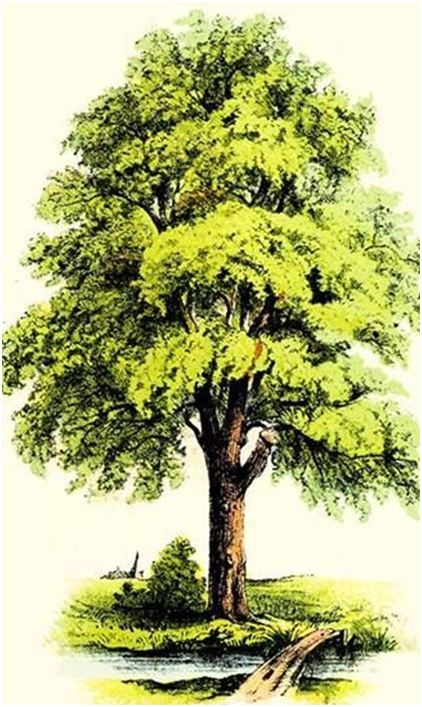- Books Name
- First Flight and Foot prints
- Publication
- ACERISE INDIA
- Course
- CBSE Class 10
- Subject
- English
Poem-8
The Trees
By Adrienne Rich

The Trees Poem Introduction
The trees in the poem are a metaphor for women, and the poem has a symbolic meaning. According to the poet, the women have rested, healed, and recovered, and are now ready to fulfil their primary mission: to renew mankind's empty forest.
The Trees Poem Summary
The poet uses trees as a metaphor. They refer to women who have been healed and are ready to leave their homes to fulfil their primary purpose – to renew mankind's forest. Because women have remained indoors, the forest has become desolate, leaving birds and insects without a place to live. The Sun's rays do not collide with tree trunks and leaves and thus do not reach the earth. She claims that the forest will be densely forested the following morning. The tree roots are working hard to separate from the veranda floor, where they have remained fixed. The leaves and branches are making their way towards the windows. They are desperate to leave, just as a newly discharged patient who has not fully recovered rushes to the hospital's exit door. The poet is sitting on her veranda with the doors open. She's writing letters, but she's not mentioning the trees' movement. It's late at night, the sky is clear, and a full moon can be seen. She can smell the leaves and lichen, which appear to be desperately calling out to her. She hears the window pane's glass shatter. The trees are edging out, and the strong wind is embracing them. As the trees reach the forest, the tall and powerful oak tree overshadows the moon, which appears to be broken into several pieces.
The Trees Poem Explanation
The trees inside are moving out into the forest,
the forest that was empty all these days
where no bird could sit
no insect hide
no sun bury its feet in shadow
the forest that was empty all these nights
will be full of trees by morning.
According to the poet, the trees are moving out of the confines of the houses and into the open forest. Because trees are immovable, this is unrealistic, and we realise that the poem has a symbolic meaning. We interpret trees to be females who have healed themselves and are ready to leave their homes and enter the forests to fulfil their primary purpose of populating the world with humans. She goes on to say that the forest has been empty for many days, so no birds can be seen because there are no trees to sit on, no insects can be seen because there is no shelter, and the sun cannot form any shadows. For many days, the forest of humanity has been empty, but it will soon be full and bright.
Literary Devices:
- Personification: Sun bury it’s feet. Sun has been personified.
- Enjambment: Continuation of a sentence to the next line (the forest that was…… trees by morning).
- Anaphora: 2 lines begin with ‘no’
- imagery: “The trees inside are moving out into the forest” – shows kinestatic imagery
All night the roots work
to disengage themselves from the cracks
in the veranda floor.
The leaves strain toward the glass
small twigs stiff with exertion
long-cramped boughs shuffling under the roof
like newly discharged patients
half-dazed, moving
to the clinic doors.
- Disengage: remove
- Strain: pressure
- Twigs: small stem
- Exertion: effort
- Cramped: restricted
- Boughs: branch
- Shuffling: mixing
- Discharged: send out
- Dazed: stu
The poet describes the plants' struggle to reach the forest. She claims that the roots worked all night to free themselves from the veranda floor. The leaves worked hard to get to the glass window so they could go outside. Even the small stems of the trees exert considerable effort in order to break free. The large branches were also attempting to emerge from the room's roof. We can say that women are desperate for a change, and their efforts can be compared to those of a patient who has been released from the hospital and tries to leave quickly despite being confused. Perhaps they are unsteady but in a hurry to leave the clinic because they are half conscious and under the influence of some medication.
Literary Devices:
- Enjambment: continuation of sentence to the next line (the leaves strain……. Half dazed)
- Simile: trees compared to patients (like newly discharged patients)
- personification: twigs and boughs have been personified.
I sit inside, doors open to the veranda
writing long letters
in which I scarcely mention the departure
of the forest from the house.
The night is fresh, the whole moon shines
in a sky still open
the smell of leaves and lichen
still reaches like a voice into the rooms
- Scarcely: barely
- Departure: leaving
- Lichen: crusty patches of bushes of fungus and algae on tree trunks, having a distict smell
According to the poet, she is sitting on her veranda, writing long letters. In her letters, she makes no mention of the trees leaving her house. She claims that the night is crystal clear. She can see the entire moon that is shining. The smell of leaves and lichens is like a yelling voice expressing a desire to be free of the confines of the house.
Literary Devices:
- Alliteration: ‘long letters’ forest from’ ‘sky still’ ‘leaves and lichen’
- Enjambment: continuation of sentence to the next line (doors open….the house)
- Imagery: the poet has tried to create a scene in which she is observing all the things happening (the night is fresh……into the rooms)
My head is full of whispers
which tomorrow will be silent
Listen. The glass is breaking.
The trees are stumbling forward
into the night. Winds rush to meet them.
The moon is broken like a mirror,
its pieces flash now in the crown
of the tallest oak.
- Whispers: murmur
- Stumbling: trip over
- Flash: glare, shine
- Oak: A large, strong tree generally used for making furniture
Her mind is filled with the slow sounds made by the trees as they try to escape. These noises will not be heard the following day. The poet instructs the reader to pay close attention because a change is about to occur. The trees stumble out into the night as she hears the glass window break. Outside, the wind is howling. It collides with the trees. The moon is like a mirror, and it appears to be broken into pieces as the oak tree's shadow divides it into many fragments.
Literary devices:
- Simile: The moon is compared to a mirror (Moon is broken like a mirror)
About the Author

Adrienne Rich (1929-2012) was born in Baltimore, Maryland, in the United States. She was a well-known feminist, essayist, and poet. She has nineteen volumes of poetry, three collections of essays, and three collections of other writings.

 ACERISE INDIA
ACERISE INDIA
